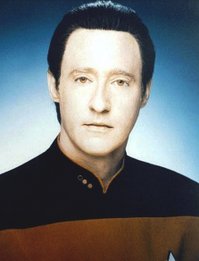Android
An android is an artificially created robot, an automaton, that resembles a human being usually both in appearance and behavior. The word derives from the Greek andr-, " meaning "man, male", and the suffix -eides, used to mean "of the species; alike" (from eidos "species"). The word droid, a robot in the Star Wars universe, is derived from this meaning. more...
In the semantic sense the word "android" is a misnomer. The intended meaning is "an artificial human being like being", while the literal translation is "an artificial male being". The word andros has definite meaning of "male human being" in Greek, while the word man can mean either "male human being" or "human being in general". The gender-neutral word for human being in Greek is anthropos, and the correct word for an artificial human being-like automaton would be anthropoid.
Usage and distinctions
Unlike the terms robot (a "mechanical" being) and cyborg (a being that is partly organic and partly mechanical), the word android has been used in literature and other media to denote several different kinds of artificially constructed beings:
- a robot that closely resembles a human
- a cyborg that closely resembles a human
- an artificially created, yet primarily organic, being that closely resembles a human
Although human morphology is not necessarily the ideal form for working robots, the fascination in developing robots that can mimic it can be found historically in the assimilation of two concepts: simulacra (devices that exhibit likeness) and automata (devices that have independence).
The term android was first used by the French author Mathias Villiers de l'Isle-Adam (1838-1889) in his work Tomorrow's Eve, featuring an artificial human-like robot named Hadaly. As said by the officer in the story, "In this age of Realien advancement, who knows what goes on in the mind of those responsible for these mechanical dolls."
Although Karel Äapek's robots in R.U.R. (Rossum's Universal Robots) (1921)âthe play that introduced the word "robot" to the worldâwere organic artificial humans, the word robot has come to primarily refer to mechanical humans, animals, and other beings. The term android can mean either one of these, while a cyborg ("cybernetic organism" or "bionic man") would be a creature that is a combination of organic and mechanical parts.
Ambiguity
Historically, science fiction authors have used "android" in a greater diversity of ways than the terms "robot" and "cyborg". In some fiction works, the primary difference between a robot and android is only skin-deep, with androids being made to look almost exactly like humans on the outside, but with internal mechanics exactly the same as that of robots. In other stories, authors have defined android to indicate a wholly organic, yet artificial, creation. Other definitions of android fall somewhere in between.
The character Data, from the television series Star Trek: The Next Generation, is described as an android. Data became intoxicated in an early episode ("The Naked Now") and is later referred to having "bioplast sheeting" for skin ("The Most Toys"), perhaps suggesting that he was initially intended by the writers to be at least partially organic. Otherwise, Data was shown to be mechanical throughout and this often became a central plot theme.
Read more at Wikipedia.org



